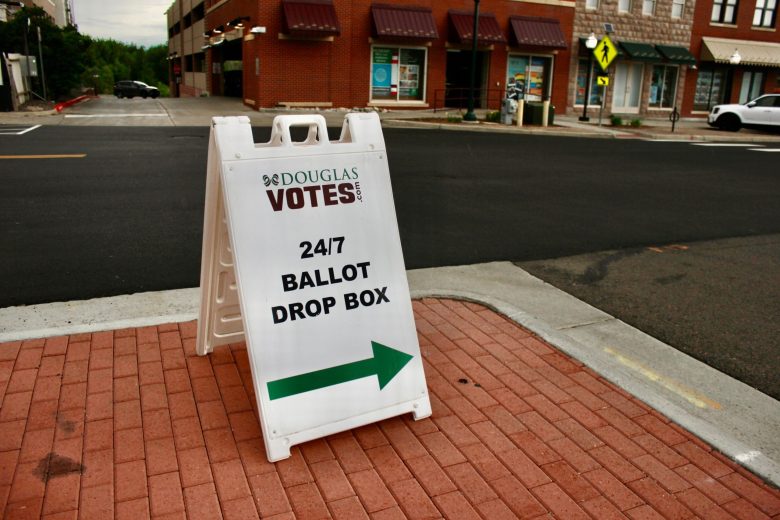Douglas County voters sent a decisive message with the June 24 home rule ballot: not so fast. But also — maybe not never?
Though home rule — the ability for the county to write its own governing charter — wasn’t universally opposed, many residents objected to how the proposal was introduced. Roughly 71% of voters rejected the measure in the special election, but conversations about home rule and the structure of Douglas County’s government are likely to keep unfolding.
The election marked a moment of broad consensus in a county with a shifting political landscape. With unaffiliated voters now making up about half of Douglas County’s electorate — which historically has been a Republican stronghold — the result offered more than a simple party-line rebuke.
Nearly 95,000 ballots were counted on Election Night, with the vast majority — over 98% — cast by mail. Unaffiliated voters made up the largest share of participants at 45.5%, followed by Republicans at 31.5% and Democrats at 23%. Turnout was highest among older voters, particularly those between the ages of 50 and 75, and was concentrated in larger suburbs like Highlands Ranch, Castle Rock and Parker.
Voter trends were made more clear in district-level races for the commission that would have written the county’s home rule charter, had the measure passed. Candidates positioned against home rule consistently outpolled pro-charter voices. Voters didn’t just reject home rule — they chose leaders aligned with that sentiment, across both at-large and respective district candidates.
If the home rule measure had passed, none of the sitting commissioners — George Teal, Abe Laydon or Kevin Van Winkle — would have secured a seat on the charter commission based on the initial vote percentages, each finishing behind the top at-large candidates.
At its core, many voters said the outcome reflected a broader frustration with county leadership.
“There (is) a lot of simmering discontent with the commissioners,” said a lifelong Republican from Lone Tree.
For others, the rushed timeline and lack of public engagement were key.
“They didn’t give any education to anybody, and now they want us to vote on the largest change to Douglas County government in its history,” said Dawn Caldwell, a Highlands Ranch resident. “I think home rule can be good or bad … If they want to do it and do it the right way, with public input, I’m happy to do it with them.”
While Laydon said he acknowledges the voices of the voters, all three commissioners said in statements posted to the Douglas County website on June 25 that they are still supportive of a home rule charter.
“While this decision may be a reaction from one group on national issues, it also presents us with a vital opportunity locally to unite and move forward together to create an even stronger Douglas County,” Laydon said in the statement.
Van Winkle added that he looks forward to continuing conversations about the importance of working together and local governance.
Teal interpreted the results as a call to slow down — not to stop.
“We were told several times during the course of the election campaign that … we’re moving too fast,” Teal told Colorado Community Media on June 25. “The people of Douglas County told us this is too fast. We need a longer conversation.”
Teal also mentioned several possibilities that would keep home rule on the table, including writing a draft charter to share with the public, organizing town halls and collaborating with former home rule opponents.
“I’m very tempted to reach out to several of them and have that conversation about … how could we do this to where you could feel comfortable to come on board,” he said. “The conversation didn’t end yesterday. It really kind of just began.”
Some residents indicated they would be open to continuing the home rule discussion — under the right conditions.
“I think home rule could probably be a good thing, but our leadership chose to shove it down our throats,” said Angela Thomas, a Democrat who ran for the charter commission. “Local control is about the people, not about three commissioners deciding in a 92-second press conference that we’re going to have a special election that cost us $500,000,” she said, referring to a special meeting in late March when the commissioners announced the home rule ballot.
Brad Geiger, a school board member who opposed the measure, said a future discussion would need to be more inclusive.
“I think there are things in Douglas County that could be improved,” Geiger said. “But to mislead people about what home rule can do, and to be so unclear about your goals … that will always offend voters, and it should.”
Geiger added he would only reconsider home rule under new commissioners.
That sentiment — wanting change, but not under the current leadership — is also fueling a renewed push to expand the board of county commissioners from three members to five. Though a home rule charter could have opened the door to that change, voters may now seek other avenues for it.
“I think five just makes it more of a voice for people,” said precinct organizer Jenna Preston. “We are saying we’re ready for bipartisanship … based on the size of our county, it is mathematically called for.”
Teal, however, remains a vocal supporter of the current three-member structure. In April, he told Colorado Community Media that he would have liked to see a home rule charter cement that model into law. After the vote, he reiterated his position, citing efficiency and cost.
“You add more people to any organizational structure, you decrease efficiency of decision-making,” Teal said.
He also estimated the cost of adding two commissioners would be about $500,000 annually.
Whether the county’s leadership will change its approach remains to be seen. Voters across parties sent a unified signal that the process must be more deliberate, inclusive and transparent.


